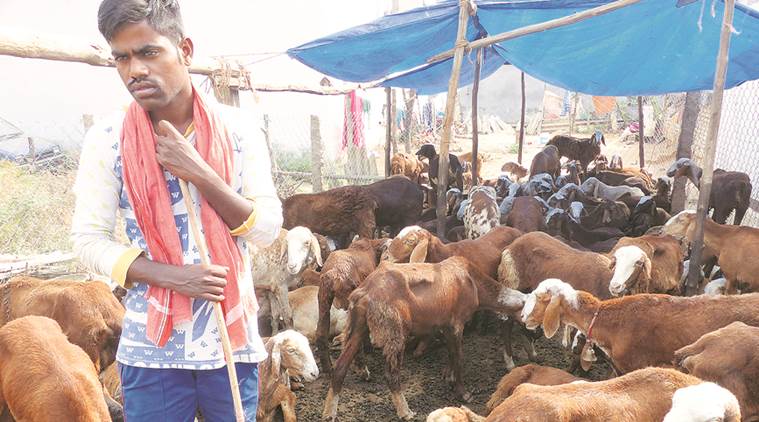If he could, a sleepless Shrikant Gorikadi would stop counting his sheep. But then he isn’t the only one keeping count. Shrikant and his father, of Sultanpur village in Sangareddy district, are among the beneficiaries of the Telangana government’s scheme of giving away sheep to traditional sheep-rearing communities of Golla and Kurma, to “encourage community-based profession”. Together, they got 42 sheep; six have since died.
“There were heavy rains recently. Due to the cold, the sheep died. I think these are from Karnataka and not accustomed to the local weather,” Shrikant says. However, the 21-year-old fears the explanation may not cut much ice with officials. After embarrassing reports of beneficiaries selling the sheep for money, and these again making their way back to the government scheme, officials are penalising those who are not holding on to their animals.

Shrikant admits he is only waiting for the sheep to give birth and for the young to grow up. “I cannot sell the 21 animals right now, but in a year’s time, more sheep will give birth, and when these kids become older, we can sell them. We may fetch Rs 6,000-7,000 per head, especially around festivals.”
Shrikant adds that while his may be a sheep-rearing community, he has not had much experience with the animals. He makes a living as a machine operator in a factory, earning around Rs 15,000 a month. His father G Ashok was a shepherd once, but in 2005, he sold all his sheep and now works as a daily wager. “I was unable to take care of the sheep and they kept dying,” Ashok says. “Plus I was in financial difficulty at the time.”
When Telangana CM K Chandrasekhar Rao announced the scheme to distribute sheep last year, Ashok applied for both Shrikant and himself. “The government was giving it free, so we also availed of the benefit,” he says. “We were given 21 animals (including one ram) each. At least 10 kids have been born in the last six months. Selling their milk is not an option because not many people buy it. We can only make some money when we sell the kids once they grow up, in three or four years maybe,” Ashok says.
Most sheep-rearing Golla and Kuruma families own five sheep on an average. By that logic, the 42 sheep given to Ashok and son is a big number. But, says Shrikant, one can’t look at it that way. “Animals keep dying and fodder is expensive. We have to work elsewhere to make ends meet.”
They are already spending precious resources to maintain the animals, Shrikant adds. First, the family scrambled to put up a pen where the sheep could be kept. “Luckily we had a small open space between my house and my uncle’s house. Then it started raining and we had to buy plastic sheets to cover the pen. But the sheets do not cover the pen entirely, and the sheep are still exposed to the weather,” says Ashok. They have branded the sheep and tied small bells on the two rams to tell their animals from those of others.
Story continues below this ad
Shrikant says that between his work and the sheep, he no longer has any free time. “Earlier, after returning from the factory, I would just sleep. My school-going brother would play or study. Now we must tend to the sheep, keep the pen clean, and chase after the kids that escape if the fence door is not immediately closed.”
Given the value of young ones, the pregnant ewe receive special treatment. “We give them more food, and take them out for grazing at 1 pm for around four hours,” Shrikant says. Since the village does not have a water trough big enough for so many sheep, they are herded to a pond about 2 km away. Shrikant’s mother also keeps aside some PDS rice, available for Rs 2 per kg, to feed the pregnant sheep.
The six who died continue to weigh on the youngster’s mind. Placing a large mud bowl with mashed white rice in front of three adult sheep, he says, “We don’t really know how to take care of them. We may have to give them some medicines, but we don’t know which.”
Animal Husbandry Minister Talasani Srinivas Yadav says they are tackling such concerns, and have set up 100 mobile veterinary clinics and a helpline. “Since June 20, we have distributed 27.80 lakh sheep to 1.3 lakh beneficiaries, which is kind of a record. As the sheep are bought from other states, the change in climate is of course a problem. We have so far received about 500 complaints of sheep dying, but compared to the 27.80 lakh sheep distributed, this is minuscule. Plus the sheep are insured, and we will replace the animals after postmortem,” he told The Sunday Express.
Story continues below this ad
Admitting a shortage of grazing land, the minister promised that the fodder problem too would be soon over. “We have imported 4 tones of grass seeds, which are being supplied to shepherds. The Forest Department has been asked to grow grass in over 10,000 acres… In three years, the population of sheep with the Golla and Kuruma communities will double, they will have sheep worth Rs 20,000 crore and Telangana would be poised to become a meat-exporting state.”

 Shrikant says that while his may be a sheep-rearing community, he has not had much experience handling the animals. (Express Photo/Sreenivas Janyala)
Shrikant says that while his may be a sheep-rearing community, he has not had much experience handling the animals. (Express Photo/Sreenivas Janyala)






